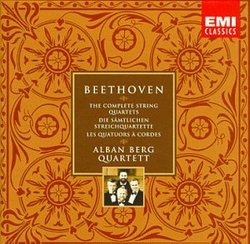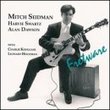| All Artists: Ludwig van Beethoven, Alban Berg Quartet, Gerhard Schulz, Hatto Beyerle, Thomas Kakuska, Valentin Erben Günther Pichler Title: Beethoven - The Complete String Quartets / Alban Berg Quartet Members Wishing: 2 Total Copies: 0 Label: EMI Classics Original Release Date: 1/1/2002 Re-Release Date: 11/16/1999 Genre: Classical Styles: Chamber Music, Historical Periods, Classical (c.1770-1830), Symphonies Number of Discs: 7 SwapaCD Credits: 7 UPC: 724357360623 |
Search - Ludwig van Beethoven, Alban Berg Quartet, Gerhard Schulz, Hatto Beyerle, Thomas Kakuska, Valentin Erben Günther Pichler :: Beethoven - The Complete String Quartets / Alban Berg Quartet
 | Ludwig van Beethoven, Alban Berg Quartet, Gerhard Schulz, Hatto Beyerle, Thomas Kakuska, Valentin Erben Günther Pichler Beethoven - The Complete String Quartets / Alban Berg Quartet Genre: Classical
|
Larger Image |
CD DetailsSimilar CDs
|
CD ReviewsTwo Beethoven cycles from the Alban Berg--which one is bette Santa Fe Listener | Santa Fe, NM USA | 03/14/2006 (5 out of 5 stars) "Founded in 1971, the Alban Berg Quartet of Vienna was the dominant ensemble in the quartets of Mozart and Beethoven for two decades. Such was their pre-eminence that EMI recorded two complete Beethoven cycles with them over the span of less than five years. The first was made in the studio in 1985, the second was recorded live at the Mozart Saal in Vienna in 1989--since the latter contains applause, it's obvious which is which upon hearing htem. But online stores like Amazon, Tower, and Crotchet do not distinguish between the two. The one pictured herer is the studio cycle. By general consensus the live recordings are warmer and freer in interpretation, the studio ones being noticeably more tightly controlled and polished. Virtually every critic prefers the 1989 cycle, which indeed is probably the best from the post-Budapest Quartet era (even surpassing the virtuosic Takacs and Emerson cycles of the last decade by combining intensity, genuine Viennese style, and sheer technical ease). I've bought both cycles and can attest that EMI's digital sound from 1985 is edgy and over-bright, making it impossible to listen comoftably at real-life volume levels, while the 1989 concert readings are in excellent sound, adding yet another reason to acquire the later set. The orange-jacket Red Line series, offered a sisngle CD at a time, is from 1985 and should be avoided. The "Great Recordings of the Century" set of the late quartets, with a photo of the four members of the Alban Berg on the cover, is from the live 1989 cycle. the only missing link is the possibility that the pictured box set here has been remastered, which the 1985 cyle certainly deserves. P.S. - A commenter offers a correction: Only the Late Quartets from this cycle were digitally recorded, and first appeared on LP in 1984. The Early and Middle Quartets were made in 1981 and 1979, respectively, and are analogue recordings, as I remember first buying them in "Seraphim" boxed sets on LP. The first CD remastering appears to have been in 1985, however, unfortunately, the entire cycle was not recorded "in the studio in 1985," as you suggest." The Best Overall Robert Thomas | Los Angeles, CA | 12/10/2004 (5 out of 5 stars) "This quartet made a deep impression on me. I have listened to performances by Quartetto Italiano, Emerson, Amadeus, Cleveland, Lindsey, Vegh, Budapest and others and although each quartet has it's strengths, I believe the Berg Quartet gives the best overall performance of these works. This remarkable ensemble seems to propel the music forward with a jet-engine thrust, while at the same time paying the greatest attention to detail, without getting lost in the minutia. By comparison, other quartets tend to sound rather square. If you want depth of feeling, hair raising excitement, and a positively authoritative performance of Beethoven's greatest works, you honestly can't do better than the ABQ. By the way, did I mention the tone? The tone, the tone, Oh God the tone. Enjoy. " Just beautiful Roger S. Gottlieb | Jamaica Plain,, MA USA | 03/29/2005 (5 out of 5 stars) "What a splendid set. I'm familiar with a number of other recordings--Cleveland, Takacs, Emerson, Budapest, Kodaly, etc.--but this is the best overall to my taste. The tone and sound are just beautiful. There is plenty of passion but no harshness. Plenty of gentleness and simply beauty when they are called for. Lots of dynamic range and varied tempi. On almost every movement (except for me Op 59 #1 second movement) they make the music come across in a fresh way that one can return to over and over.
Also, beautifully recorded. Can't imagine anything better (though the Auryn quartet is wonderful, as well.)" |

 Track Listings (7) - Disc #1
Track Listings (7) - Disc #1